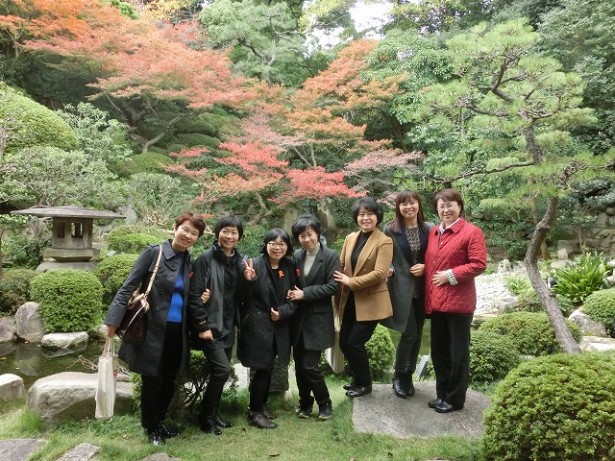Over the Years
Home > Over the Years > Over the Fiscal Years (2010 APR - 2020 MAR) > Six Nurses from Korea Invited for Training
Six Nurses from Korea Invited for Training
HICARE invited six nurses from Korean hospitals affiliated to the Republic of Korea National Red Cross that provide medical care for radiation-exposure victims, for training on the treatment of radiation disorders.
Names and Titles of Trainees:
| KIM CHUNOCK | Nurse, Kyung Hee University Hospital |
| LEE NANJU | Nurse, Busan Veterans Hospital |
| KIM HYUNJOO | Nurse, Seoul Red Cross Hospital |
| BACK UNOK | Nurse, Geochang Red Cross Hospital |
| LEE EUNYOUNG | Nurse, Yeungnam University Hospital |
| KOO JAIM | Nurse, Korea Red Cross Incheon Hospital |
Period of Training:
November 25 to 29, 2013
Training Organizations (in order of visits):
Hiroshima University Hospital (Advanced Emergency and Critical Care Center)
Hiroshima Red Cross Hospital & Atomic-bomb Survivors Hospital
Kurakake Nozomi-en (A-bomb survivors nursing home)
Radiation Effects Research Foundation
Hiroshima Atomic Bomb Casualty Council
Hiroshima Peace Memorial Museum, etc.
Training Course:
Diagnosis of radiation disorders
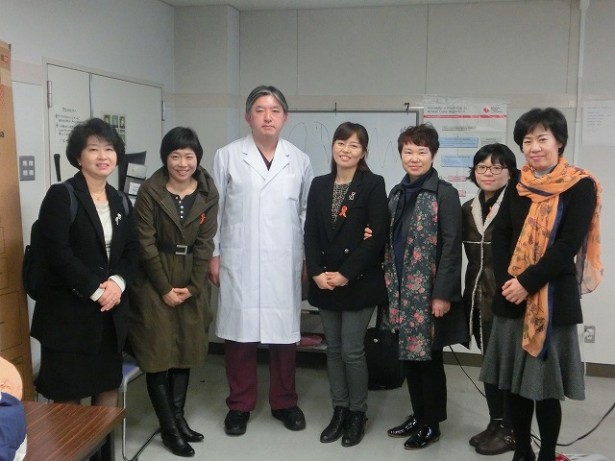
With Associate Professor Nobuyuki Hirohashi, Advanced Emergency and Critical Care Center of Hiroshima University Hospital (3rd from left)
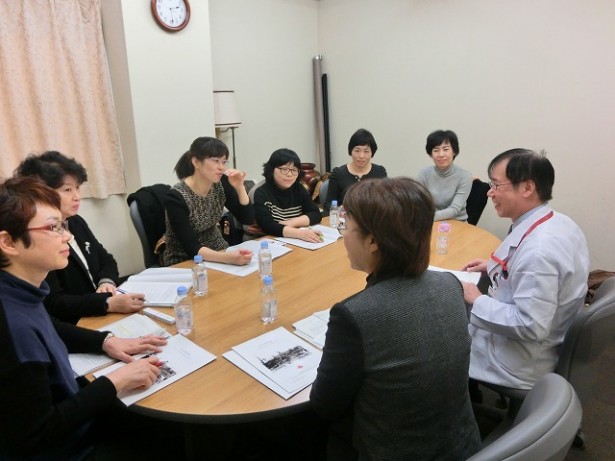
With Dr. Kenichi Arita, Director of Department of Respiratory Disease of Hiroshima Red Cross Hospital & Atomic-bomb Survivors Hospital (far right)
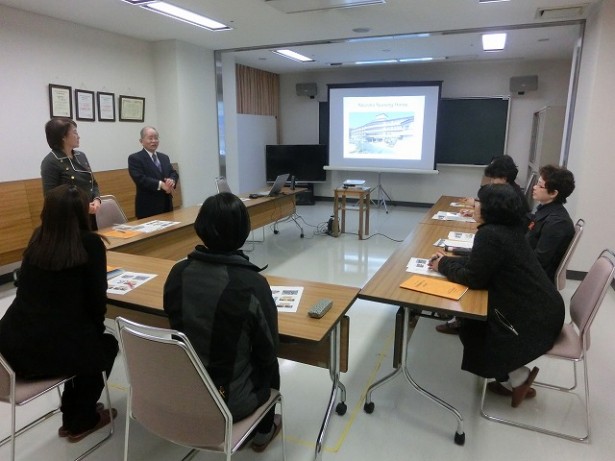
With Dr. Nanao Kamada, Board Chairman of Hiroshima A-Bomb Survivors Relief Foundation (back row, left)
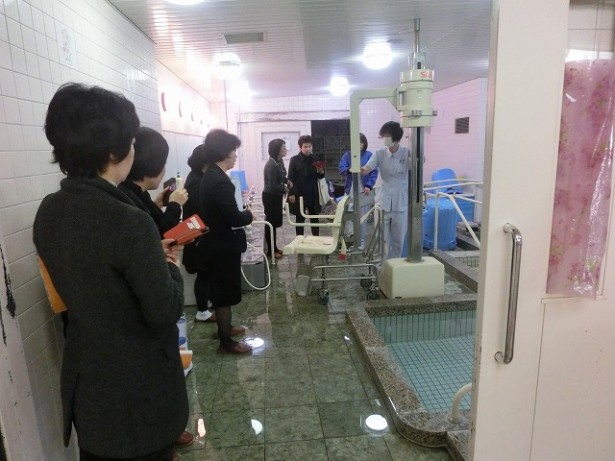
Facility Tour at Kurakake Nozomi-en
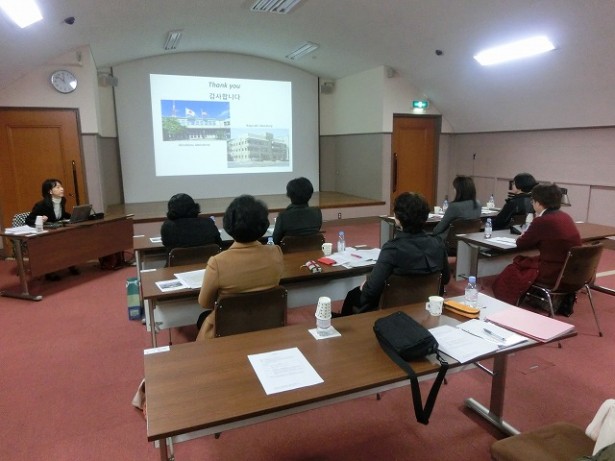
With Dr. Tatsukawa, Associate Senior Scientist, Department of Clinical Studies, Radiation Effects Research Foundation (far left)

With Dr. Saeko Fujiwara, Director of Health Management & Promotion Center, Hiroshima Atomic Bomb Casualty Council (front row, left)
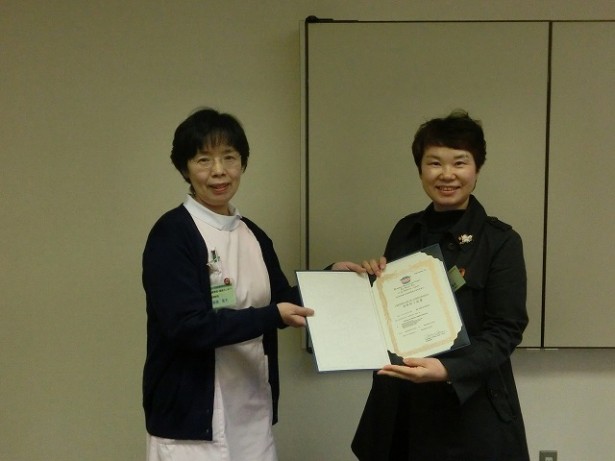
Ms. Kim Chun Ock (right) receiving the Certificate of Completion from Ms. Saito, Head Nurse of Hiroshima Atomic Bomb Casualty Council
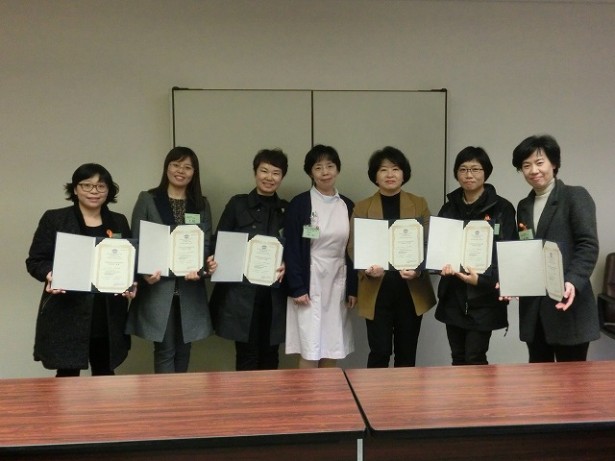
Received the Certificate of Completion
Feedback:
- I thought that I knew about casualties of the A-bomb, but when I actually saw the tragedy of Hiroshima with my own eyes, I felt a terrible pain. I will carefully consider the effective utilization of nuclear energy, and join antinuclear weapons movements for world peace. When I go back home, I will commit myself to working for A-bomb survivors living in Korea with a deep understanding of their needs and pain.
- Dr. Kamada, President of Kurakake Nozomi-en (nursing home for A-bomb survivors) gave us a briefing of their projects and lectured us on effects of A-bomb radiation on the human body. They pay great attention to the nutrition and health management of the residents. They have a bath with a mechanical chair enabling a resident to dip into a bath while seated. The residents (A-bomb survivors) seemed relaxed and relieved in rooms with 24-hour ventilation systems.
- I was anxious about the radiation exposure due to my lack of knowledge. The HICARE program reduced my anxiety by leading me to obtaining the proper knowledge about radiation and how to protect myself while responding to radiation emergencies. Through the program, I learned about A-bomb casualties and the process of the diseases, and got to know the feelings of A-bomb survivors. I think I will be able to take care of the A-bomb survivors living in Hapcheon in different ways when they receive health check-ups.
- I learned about radiation disorders in detail. Before that I only had a vague understanding. I promise that I will not forget the pain felt in Hiroshima even when I go back home, and will play an active role in caring for all the patients who will visit our hospital.
- I learned a lot about the effects of radiation on the human body, so I think I will be able to understand patients that survived the A-bomb better in caring psychologically and physically for them. As I felt strong fear about nuclear weapons and radiation contamination, I will make the utmost efforts to prevent them from being used or happening in the future.
- Dr. Hirohashi of Hiroshima University Hospital gave us a lecture on the principles and procedure of the medical response to radiation emergencies (including examples of the Fukushima accident). It was very useful.
And Dr. Arita of Hiroshima Red Cross Hospital & Atomic Bomb Survivors Hospital said “Imagine what you could have done if you were there (when Hiroshima was A-bombed)”. I cannot forget that statement. Dr. Arita also said that the basics of nursing are listening to and observing your patients well. I was deeply inspired by his messages.
